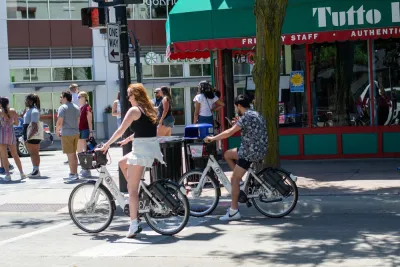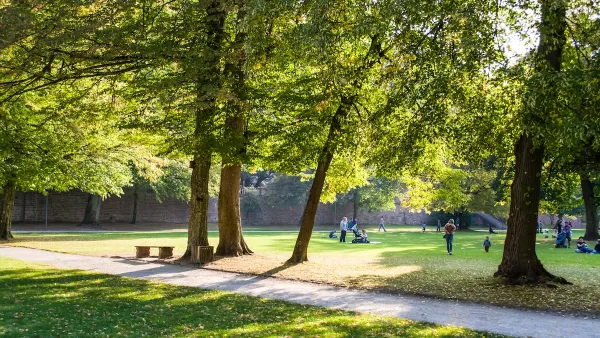The new document consolidates the city’s Complete Streets projects with its sustainability plan, providing a flexible framework for comprehensive actions that focus on safety, sustainability, and equity.

Madison, Wisconsin is adopting a “Complete Green Streets” policy aimed at consolidating the city’s efforts to build safe, accessible, and pleasant streets for all with its sustainability goals. Writing in Smart Cities Dive, Maria Rachal explains that the policy is designed to be a “flexible tool that can evolve” with the city’s needs.
According to the new city-issued guide, “With significant growth and development, rising concerns about safety, and increased awareness of disparities, Madison needed a more detailed approach to designing streets that reflects our community’s values and priorities.”
The new policy combines Complete Streets and focuses on four values: prioritizing the safety and comfort of people; supporting community engagement and emphasizing short neighborhood trips; fostering more sustainable transportation and land use; and centering equity, which the city defines as “engaging inclusively, providing access to opportunities, prioritizing and supporting the needs of historically underserved people.”
FULL STORY: Madison, Wisconsin, approves complete green streets policy

National Parks Layoffs Will Cause Communities to Lose Billions
Thousands of essential park workers were laid off this week, just before the busy spring break season.

Retro-silient?: America’s First “Eco-burb,” The Woodlands Turns 50
A master-planned community north of Houston offers lessons on green infrastructure and resilient design, but falls short of its founder’s lofty affordability and walkability goals.

Delivering for America Plan Will Downgrade Mail Service in at Least 49.5 Percent of Zip Codes
Republican and Democrat lawmakers criticize the plan for its disproportionate negative impact on rural communities.

Test News Post 1
This is a summary

Test News Headline 46
Test for the image on the front page.

Balancing Bombs and Butterflies: How the National Guard Protects a Rare Species
The National Guard at Fort Indiantown Gap uses GIS technology and land management strategies to balance military training with conservation efforts, ensuring the survival of the rare eastern regal fritillary butterfly.
Urban Design for Planners 1: Software Tools
This six-course series explores essential urban design concepts using open source software and equips planners with the tools they need to participate fully in the urban design process.
Planning for Universal Design
Learn the tools for implementing Universal Design in planning regulations.
EMC Planning Group, Inc.
Planetizen
Planetizen
Mpact (formerly Rail~Volution)
Great Falls Development Authority, Inc.
HUDs Office of Policy Development and Research
NYU Wagner Graduate School of Public Service





























